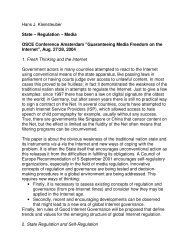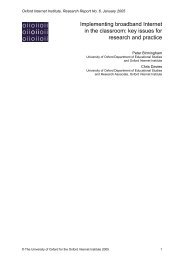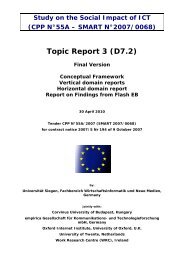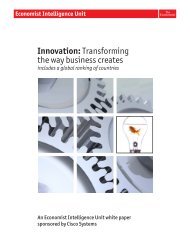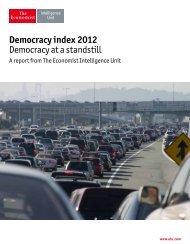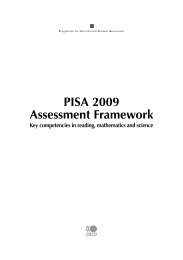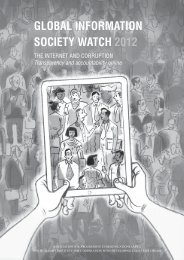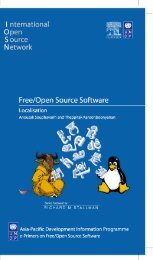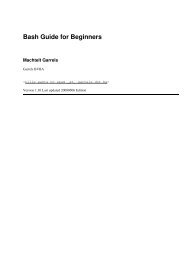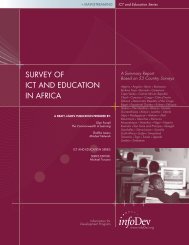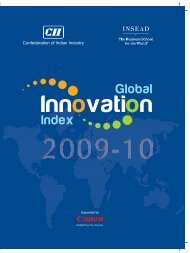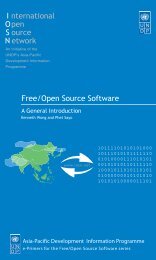Legal Aspects of the Information Society. - Free Technology Academy
Legal Aspects of the Information Society. - Free Technology Academy
Legal Aspects of the Information Society. - Free Technology Academy
You also want an ePaper? Increase the reach of your titles
YUMPU automatically turns print PDFs into web optimized ePapers that Google loves.
GNUFDL • 27 Intellectual property: authors' rights and copyright<br />
4.2.4. Transformation right<br />
The transformation <strong>of</strong> works includes <strong>the</strong>ir translation, adaptation and any<br />
o<strong>the</strong>r modification by which a different work is created. Should <strong>the</strong> transformation<br />
be made without authorisation (express or implicit through <strong>the</strong> collaboration<br />
<strong>of</strong> <strong>the</strong> author <strong>of</strong> <strong>the</strong> pre-existing work), <strong>the</strong> Authors' rights <strong>of</strong> <strong>the</strong><br />
rightsholder <strong>of</strong> <strong>the</strong> original work shall have been violated.<br />
As we have already noted, <strong>the</strong> Authors' rights or copyrights in <strong>the</strong> work resulting<br />
from a transformation correspond to <strong>the</strong> new author. This author will<br />
none<strong>the</strong>less require authorisation from <strong>the</strong> author <strong>of</strong> <strong>the</strong> pre-existing work<br />
during <strong>the</strong> entire term <strong>of</strong> protection <strong>of</strong> <strong>the</strong>ir rights to <strong>the</strong> original work, to exploit<br />
<strong>the</strong> results by any means (e.g. directly or by distribution to third parties)<br />
and, especially, through its reproduction, distribution, public communication<br />
or new transformation.<br />
There are certain limits to this right in relation to s<strong>of</strong>tware, as we will see below.<br />
Transformationrightsandfrees<strong>of</strong>tware<br />
As we have explained in <strong>the</strong> section on original works and derivative works,<br />
<strong>the</strong> model commonly used for <strong>the</strong> development <strong>of</strong> free s<strong>of</strong>tware <strong>of</strong>ten implies<br />
<strong>the</strong> transformation <strong>of</strong> pre-existing works.<br />
Therefore, free s<strong>of</strong>tware licences consider <strong>the</strong> licensing <strong>of</strong> such transformation<br />
right one <strong>of</strong> <strong>the</strong> bases <strong>of</strong> s<strong>of</strong>tware freedom. In o<strong>the</strong>r words, if a licence does<br />
not grant any transformation rights, it is not a free licence.<br />
While <strong>the</strong>re is significant debate about <strong>the</strong> scope <strong>of</strong> a derivative work, it generally<br />
results from a modification <strong>of</strong> <strong>the</strong> original work (adding, eliminating<br />
or modifying elements from <strong>the</strong> prior work) and/or, more arguably, its integration<br />
into a greater work that is based on <strong>the</strong> component (however, this<br />
depends on its form <strong>of</strong> integration).<br />
Binary s<strong>of</strong>tware<br />
For example, binary s<strong>of</strong>tware is<br />
defined as a transformation <strong>of</strong><br />
<strong>the</strong> source code, and an implementation<br />
<strong>of</strong> <strong>the</strong> code for o<strong>the</strong>r<br />
hardware/devices.<br />
Derivative works require <strong>the</strong> authorisation <strong>of</strong> <strong>the</strong> rightsholder in <strong>the</strong> prior<br />
work (express via licence, or implicit through <strong>the</strong> collaboration <strong>of</strong> <strong>the</strong> author),<br />
and a work incorporating pre-existing work without authorisation would infringe<br />
upon <strong>the</strong> Authors' rights <strong>of</strong> <strong>the</strong> owner <strong>of</strong> <strong>the</strong> original work, as we will<br />
see below.<br />
Derivative works are a controversial subject with respect to free s<strong>of</strong>tware, due<br />
to <strong>the</strong> difficulties in distinguishing between derivative work, collaborative or<br />
joint work and collective or composed work and what authorisations are required<br />
to create a work including third party components, libraries, etc. The<br />
difficulties arise basically in two respects:



